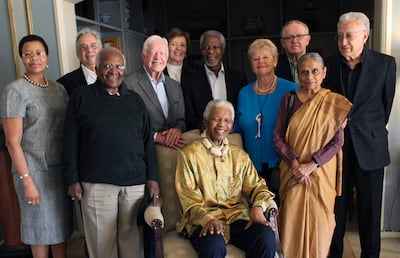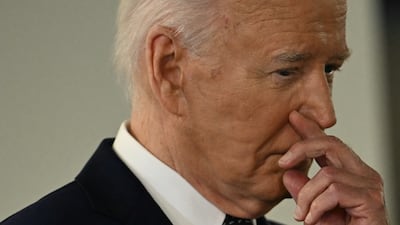For months, and not just after his disastrous presidential debate appearance, Americans have been saying that Joe Biden is too old to serve another term in the White House. In a February poll for ABC News, 86 per cent of those surveyed said so. That was up from 74 per cent last September.
It is a sure bet that no one changed their mind for the better about Mr Biden after watching his excruciating performance last week. But Mr Biden’s age – he’s 81 – is not the real issue. That is his evident mental and physical decline.
I make the distinction because I feel we are collectively in danger of drawing the wrong lesson here. And I say so with confidence because of the examples we’ve had in South-East and East Asia, where some of the most towering figures in national, regional and global politics have continued well into old age, and their peoples have had cause to thank them for their continued service.
Malaysia’s current Prime Minister, Anwar Ibrahim, is 76, only five years younger than Mr Biden, but he’s as sprightly and acute as ever. His age simply isn’t an issue. In Singapore, the country’s founding leader, Lee Kuan Yew, continued in office as Senior Minister and then Minister Mentor during his 80s, finally stepping down at the age of 87.
If anyone doubted that the formidable Mr Lee wasn’t still a force to be reckoned with in his later years, they should have remembered what he’d said before: “Even from my sickbed, even if you are going to lower me into the grave and I feel that something is going wrong, I will get up. Those who believe that after I have left the government as prime minister, I will go into a permanent retirement, really should have their heads examined.”
The former Thai leader Prem Tinsulanonda was president of the country’s influential Privy Council from 1998 until his death aged 98 in 2019, and played a hugely important role – often semi-behind the scenes – in trying to steer a country prone to coups and protests towards a stable path, enabled by his position as a representative of the revered royal institution.
China’s former paramount leader, Deng Xiaoping, was in power well into his 80s, and was 87 when he undertook his “southern tour”, which many credit with saving the country’s economic reform programme that laid the foundations for its great successes today.
And of course in Malaysia, where I live, in 2018 the then 93-year-old Mahathir Mohamad returned as prime minister for a second time. He may have “often looked and felt extremely tired and frequently visited the hospital for various health checks”, as Romen Bose notes in his fast-paced and insightful new book on the Mahathir administration, Shattered Hopes, but when he turned his mind to something his focus remained laser-like, as his political foes found to their cost.

It may have been partly due to local or regional culture, but it was noticeable at the time that almost nobody in the country seemed to think that electing a nonagenarian as prime minister would be ridiculous. Maybe that wasn’t just “Asian values” in action. For revering experience in many fields is, after all, quite normal. To call someone an “elder statesman” is a compliment, implying valuable depths of knowledge and judgment.
There was a reason why Nelson Mandela called his new group “the Elders” when he founded it in 2007. The six retired leaders were widely recognised as having the moral authority and experience to “support courage where there is fear, foster agreement where there is conflict and inspire hope where there is despair”, as Mr Mandela put it.
Former US president Jimmy Carter was among them. Mr Carter is 99 and in a hospice, and perhaps I am speaking for myself here, but is there anyone alive today who is as much admired for his ethical clarity?
Youth, on the other hand, may often be overrated.
Emmanuel Macron was only 39 when he was first elected President of France. He proclaimed that he was bringing a fresh approach to politics, under his “alternative centrism”, which, to many, looked right wing and out of touch with ordinary voters. In the years since, the far-right National Rally has steadily gained ground to the point that it appears poised to win the second round of France’s parliamentary election this weekend.
Those who regard that prospect as a catastrophe point the finger of blame firmly at Mr Macron. An older conservative in the mould of former president Jacques Chirac may have been able to keep the populists to the margins, as he did.
But Mr Macron is a mature oak compared to what could come next. If the National Rally does win an overall majority, its candidate to be prime minister is Jordan Bardella. Friends who have met him describe him as impressive, but at 28 could he possibly have what it takes to lead a government of the world’s seventh-largest economy?
Coming to power at an early or earlyish age presents another problem: what to do during the decades once you are out.
For UK prime ministers, to take one example, the experience has been mixed. Tony Blair left office at the relatively youthful age of 54 and, whatever his critics say, has maintained his commitment to public service with international, academic and charity roles and his own institute.
Another predecessor, Ted Heath, remained an MP for 27 years after losing the premiership, but the ill grace he never ceased to display at losing the Tory leadership in 1975 earned him the nickname “the incredible sulk”. Before returning as foreign secretary, David Cameron was reported to have told friends just how “bored” he was two years after leaving Downing Street aged 49.
So, in all the discussions about Mr Biden, let us not forget the value of age and experience. The problem is not how old he is, but that he no longer has what China’s Mr Deng and Singapore’s Mr Lee manifestly had well into their 80s – a mind (and in Mr Lee’s case a tongue) as sharp as a razor. And not just on “good” days.


